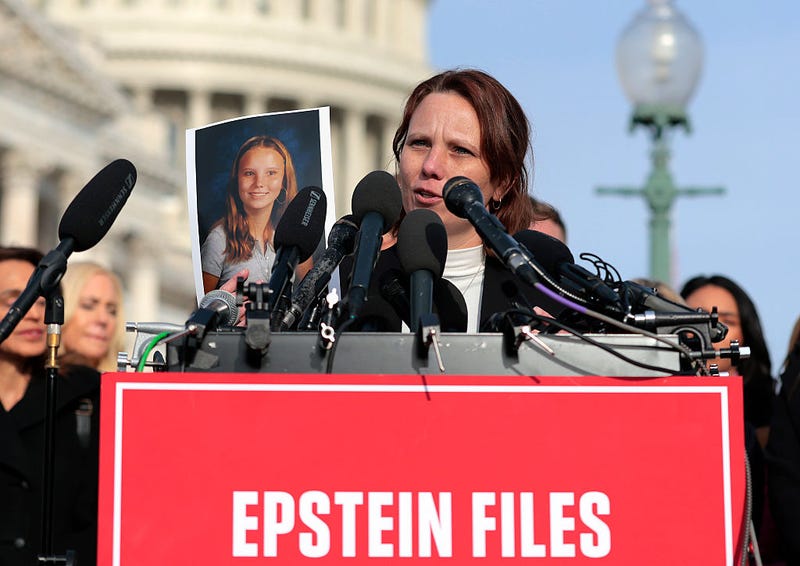
This past week felt like the ground shifted under our feet.
For years, Americans of every political stripe have demanded the release of “the Epstein files,” even if most people weren’t entirely sure what that meant. Were we talking about flight logs? Emails? Grand jury records? Something else? Whatever the definition, the spirit was the same: turn the lights on. Stop hiding. Show us everything.
And until now, that demand always hit the same stone wall, but now things have changed - or at least, we can hope they have.
In a rare moment of overwhelming bipartisan agreement, both the House and the Senate voted to require the Department of Justice to release its Epstein-related records. President Trump signed the bill almost immediately. After being held back for months, the whole thing was over in less than 36 hours. That kind of speed is almost unheard of in modern Washington.
We are conditioned to expect nothing but evasions and excuses, so this really felt like a breakthrough. We all worked together to pressure the political system until it yielded.
But just as the celebration started, something else happened.
The Justice Department simultaneously announced that parts of the Epstein investigation were being re-opened because of “new information.” And here’s why that’s potentially a problem: under federal law, an active investigation allows DOJ to withhold related documents from public release.
In other words, The Epstein Files Transparency Act has a built-in escape hatch and it’s insane to think that the DOJ under Pam Bondi’s leadership won’t use it.
And that should concern everyone.
What the Epstein Emails Already Tell Us
Totally separate from DOJ’s files, the House Oversight Committee recently released 20,000 pages of emails from the Epstein estate. These aren’t rumors ot biased reports, they are primary-source documents, and they contain several revelations that are impossible to ignore.
1. Epstein wrote: “Of course he knew about the girls.”
In an email dated January 31, 2019, Epstein wrote of Donald Trump: “Of course he knew about the girls as he asked Ghislaine to stop.”
There’s no ambiguity in that statement. Epstein is asserting firsthand knowledge. That’s the end of that email, we can’t know with 100% certainly what Donald Trump asked Ghislaine to “stop doing,” but based on what Trump said is the reason he kicked Epstein out of Mar A Lago for, he wasn’t asking Ghislaine Maxwell to stop trafficking young girls entirely… only to stop approaching girls who worked for him.
Many people still believe the public-relations version of events, that Trump cut ties with Epstein because Epstein “was a creep” or “hit on a staffer.” But that doesn’t even match Trump’s explanation.
On July 29 of this year, Trump told reporters onboard Air Force One that Epstein “stole” young women who worked at his spa at Mar-a-Lago. He said this was the reason their relationship ended. When asked whether one of the people was Virginia Giuffre, Trump responded: “I think so. I think so. I think that was one of the people. Yeah. He stole her.”
2. The “dog that hasn’t barked” email
Epstein also wrote: “I want you to realize that the dog that hasn’t barked is Trump. Virginia spent hours at my house with him… he has never once been mentioned.”
I believe this is a direct reference to a Sherlock Holmes story called The Adventure of Silver Blaze, where a guard dog doesn't bark at the criminal at the moment he is committing the crime - that tells Sherlock that the intruder was someone the dog recognized. So Epstein was implying that Trump’s silence on the issue was not innocence, it was familiarity. Trump didn’t “bark” when Epstein’s continued abuse of girls in the 2010’s was revealed - because he already knew about it.
A pattern of ambivalence
Separate from the Epstein material, this administration has intervened in several ways that raise eyebrows, particularly if one claims to be defending children:
Helping influencer Andrew Tate regain his devices and ease scrutiny while he faced trafficking and rape charges in Europe.
Returning an Israeli cyber official, Tom Alexandrovich, to his home country almost immediately after a U.S. arrest in a sting involving minors.
Granting blanket Jan. 6 pardons that released multiple registered sex offenders, without case-by-case review.
None of this satisfies our demand for tough-on-sex-crimes moral leadership.
Why Moral Clarity Matters Now
I said this on air Friday (you can hear all this in the audio player above), and it’s worth repeating here:
If moral clarity means anything, it means no more shadows, no more excuses.
We have the right to know who enabled Epstein. We have the right to know who participated. I don't care who looks guilty or who loses their job or disappears from public life forever. I don't care if it's Trump, Bill Clinton, Michael Wolff, Larry Summers. It doesn't matter. This isn't about scoring political points, it's about justice. It's about rectitude.
That’s not partisan. That’s not ideological. That’s human.
We deserve answers. We earned answers. The truth cannot stay buried forever. It might be uncomfortable, it might be embarrassing, but the truth is coming eventually. What we say and do in these days will always be what we said and did in the days before the breadth and depth of Epstein’s crimes was fully revealed.
Act accordingly.
